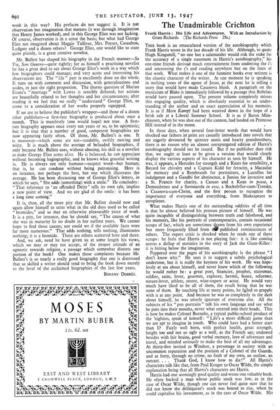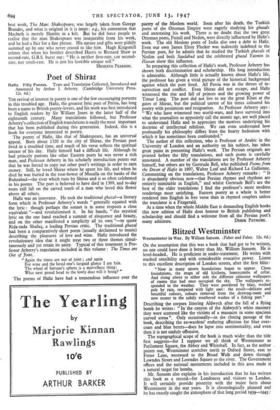The Unadmirable Crichton
THIS book is an emasculated version of the autobiography which Frank Harris wrote in the last decade of his life. Although, to quote Hugh Kingsmill, " no one but a salamander would risk the stake for the accuracy of a single statement in Harris's autobiography," his one-time friends derived much entertainment from undotting the i's and uncrossing the es and reading anywhere but on the lines of that work. What makes it one of the funniest books ever written is the chaotic character of the writer. At one moment he is speaking in melting tones of the agony of Jesus, at the next he is telling a story that would have made Casanova blush. A paragraph on the mysticism of Blake is immediately followed by a passage that Rabelais would have paused upon. The present volume completely misses this engaging quality, which is absolutely essential to an under- standing of the author and an exact appreciation of his memoirs. It is as if Mein Kampf had been watered down in the hope of a brisk sale at a Liberal Summer School. It is as if Baron Miin- chausen, when he was shot out of the cannon, had landed on Primrose
Hill instead of in the moon. •
In these days, when several four-letter words that would have shocked our fathers it/ print are casually introduced into novels that are eagerly devoured by spinster aunts and hearty grandmothers, there is no reason why an almost unexpurgated edition of Harris's autobiography should not be issued. But if no publisher dare risk that, we ought at least to be given a version that would clearly display the various aspects of his character as seen by himself. He was, it appears, a Hercules for strength and a Keats for sensibility, a Bayard for chivalry and a Captain Kidd for ferocity, a Macaulay for memory and a Rembrandt for portraiture, a Lucullus for indulgence and a Gandhi for abstinence, a Junius for invective and a St. Francis for charity, a Caruso and a Kean in posse, a Demosthenes and a Savonarola in esse, a Rockefeller-cum-Trotsky, a Casanova-cum-Christ, and the first person to recognise the importance of everyone and everything, from Shakespeare to aeroplanes.
What makes Harris one of the outstanding oddities of all time is that he almost believed his protean picture of himself. He was quite incapable of distinguishing between truth and - falsehood, and his memoirs, like his portraits of contemporaries, contain occasional scraps of fact, which are sometimes clawn from his own experience but more frequently lifted from dIW published reminiscences of others. The expert critic is shocked when he reads one of these scraps : he feels that Harris is not playing fair : it is like coming across a dollop of statistics' in the story of Jack the Giant-Killer : it is hitting below the imagination.
Peppered over the pages of his autobiography Is the phrase " I don't know why." He uses it to suggest a subtle psychological undertone, but it is really the keynote of his work. He was hope- lessly at sea about himself, and never knew which of the following he would rather be : a great poet, financier, prophet, statesman, soldier, saint, lover, gourmet, explorer, hermit, boxer, reformer, nature-lover, athlete, orator, wine-expert or actor. He would very much have liked to be all of them, the result being that he was none of them. By touching life at many points, he failed to grapple with it at any point. And because he was so completely in the dark about himself, he was utterly ignorant of everyone else. All the subjects of his " pen portraits " talk his own language and say what he puts into their mouths, never what entered into their heads. This is how he makes Colonel Burnaby, a typical public-school product of the 'eighties, speak of himself : " Life's a more difficult game than we are apt to imagine in youth. Who could have had a better start than I? Fairly well born, with perfect health, great strength, height too and not so ugly as a wolf, as the French say; endowed besides with fair brains, good verbal memory, love of adventure and travel, and minded seriously to make the best of all my advantages. At thirty-five invited to Windsor, a personage in society with an uncommon reputation and the position of a Colonel of the Guards, and at forty, through no crime, no fault of my own, an outlaw, an outcast. . . . Thank God, I know how to die!" All Harris's characters talk like that, from Paul Kruger to Oscar Wilde, the simple explanation being that all Harris's characters are Harris. Harris had one seemingly good quality and wrote one valuable book. He often backed a man whose public stock was low, as in the case of Oscar Wilde, though one can never feel quite sure that he did not know the delinquent's stock was bound to rise, when he could capitalise his investment, as in the case of Oscar Wilde. His best work, The Man: Shakespeare, was largely taken from George Brandes, and what is original in it is inept : e.g., his contention that Macbeth is merely Hamlet in a kilt. But he did force people to realise that the man Shakespeare was inseparable from his work, and he had a flair for a fine phrase. His nature and gifts were pithily summed up by one who never ceased to like him. Hugh Kingsmill relates that when his brother descrilaed Harris to Bernard Shaw as second-rate, G.B.S. burst out : " He is neither first-rate, Lor second- rate, nor tenth-rate. He is just his horrible unique self."
HESKETH PEARSON.



































 Previous page
Previous page